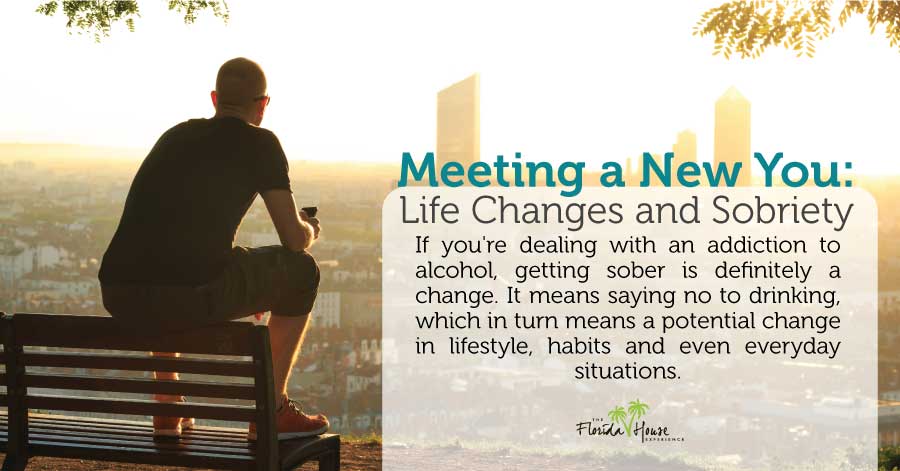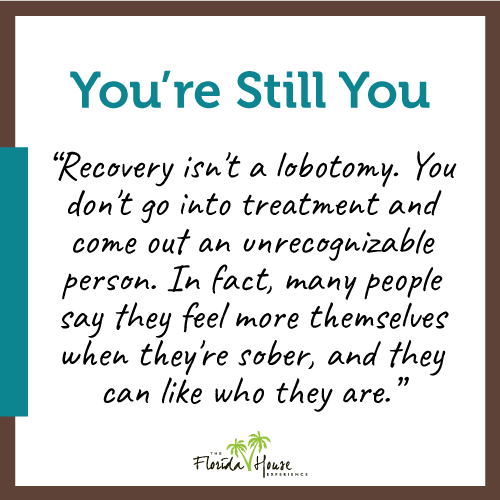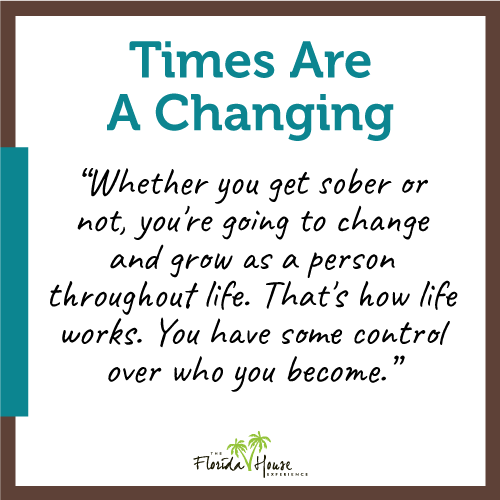
If you’re dealing with an addiction to alcohol, getting sober is definitely a change. It means saying no to drinking, which in turn means a potential change in lifestyle, habits and even everyday situations.
But you don’t become a completely different person just because you go through recovery. Find out more about the changes you might need to make or experience when you decide to work toward an alcohol-free lifestyle.
You’re Still You — Just Sober
 The first thing to understand is that you’ll still be you after rehab. Hopefully, you’ll just be the sober version of you. That’s important to know if you like who you are but just want to cut out the drinking.
The first thing to understand is that you’ll still be you after rehab. Hopefully, you’ll just be the sober version of you. That’s important to know if you like who you are but just want to cut out the drinking.
Recovery isn’t a lobotomy. You don’t go into treatment and come out an unrecognizable person. In fact, many people say they feel more themselves when they’re sober, and they can like who they are.
But that doesn’t mean you’re not going to change a little. You’re planning to take something out of your life that has been a potentially controlling factor for some time — alcohol. The same is true if your substance of choice is a drug.
If you’re dealing with an addiction, then choosing to stop using and become sober is kind of like breaking up with a person that just isn’t right for you (or is even abusive to you). You’re still you, but the you without that person may be freer to follow dreams, make better decisions and enjoy life more. Ultimately, those are also potential benefits and positive changes of seeking sobriety.
Lifestyle Changes You May Make to Remain Sober
One of the first types of changes you may see — and that are very tangible to others right away — are lifestyle changes. You may need to remove yourself from certain situations to protect your sobriety, and that can be difficult.
This is something you’ll discuss at length during rehab and therapy throughout your recovery and is one reason it’s so important to seek strong aftercare support after leaving rehab. Surrounding yourself with people and structures that are supportive of your sobriety is important. Social supports, along with 12-step affiliation, have been shown to be a major factor in individual success with long-term addiction recovery.
In addition to integrating these types of support groups and structures into your life, other lifestyle changes you might face can include:
- Stepping back from friends or loved ones who pressure you to do things that might endanger your sobriety, such as enjoy “just one drink”
- Avoiding certain locations or scenarios that might lead you to drink, including bars or parties — at least at first
- Learning to make healthier lifestyle choices and commit to self-care to reduce stressors and triggers that might lead to drinking or drug use
Many of these changes are positive and can help you be healthy, fit and love the person you are again. Yes, some of them aren’t “fun” because they may involve removing yourself from situations and people you previously enjoyed. But if your friends and family can’t be supportive of you deciding to break up with alcohol, then you may need to decide that you are worth more than that.
Growing Through Recovery
 In an article published in the Yale Journal of Biology and Medicine, rehab and therapy professional Steven M. Melemis calls recovery “a process of personal growth with developmental milestones.”
In an article published in the Yale Journal of Biology and Medicine, rehab and therapy professional Steven M. Melemis calls recovery “a process of personal growth with developmental milestones.”
That’s a description that definitely evokes change, but it doesn’t have to be a scary change. Whether you get sober or not, you’re going to change and grow as a person throughout life. That’s how life works.
Going through rehab is just one of those steps on the road to your future — except it’s a much more positive step than continuing in the cycle of addiction.
The Substance Abuse and Mental Health Services Administration publishes a booklet about recovery and how it’s about working your way toward a better life. In that book, the SAMHSA provides four signs that let you know whether you’re in recovery. They are:
- You know how and are able and willing to answer life’s problems and stressful situations with healthy coping mechanisms, not drugs or alcohol.
- You are able to maintain personal boundaries, understanding which issues are yours and which are not yours. You realize that you can’t always handle other’s problems.
- You have a support system for your sobriety and at least one person in your life who is stable and trustworthy enough that you can be completely honest with them.
- You know how to engage in self-care, and you do it when you’re stressed or tired to restore your energy in healthy ways.
For individuals who have struggled with addiction, these would likely be changes. But they’re positive changes that help you take control of your life away from the addiction.
These changes don’t mean your personality is altered in a body-snatchers sort of way. You still have your memories, likes and dislikes, preferences and dreams. But you’ll also have clarity, capability and accountability, which are all positive changes that speak of growth.
It’s not sobriety that changes you. Sobriety is a sign that you are growing and evolving in a natural way that lets you look forward to a more positive future.
Get Help Achieving This Positive Change
Most people in life don’t achieve this type of positive change alone. Successful business people have mentors. Many people seek the feedback of therapists or life coaches. If you’re caught in addiction, you don’t have to face the battle alone, and you can find help seeking the positive change that lets you look to a brighter future.
If you’re ready to start making these changes and embrace a new you who is more you than you are able to be right now, contact FHE Health today.






